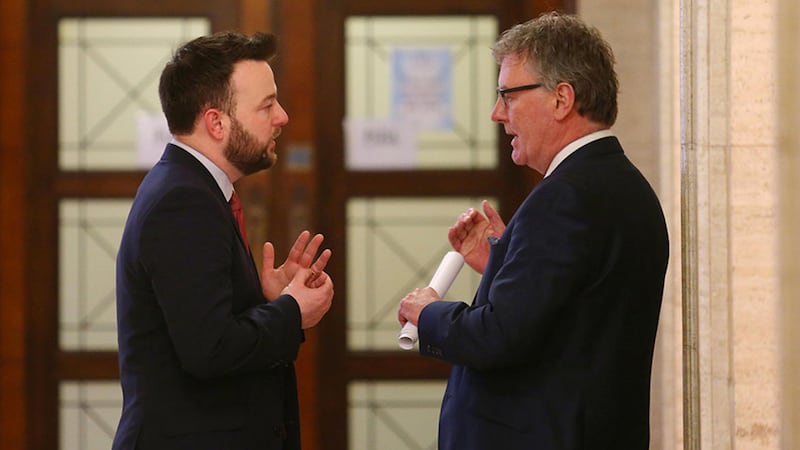The joint UUP-SDLP alternative ‘government’ project didn’t last long did it? In fact it instantly collapsed when Mark Carruthers posed the first set of questions about it on Sunday.
No, not just the row about transfers to ‘the other side’. The very idea that two parties each with less than half the seats of the DUP and Sinn Féin could suddenly somehow double their seat numbers and form an executive is self-evidently an absurd proposition which neither party leader could explain.
As correctly predicted here last year opposition at Stormont is a nonsense and has achieved precisely nothing. It’s a concept driven by unionism and the automatic unionist bias of much of the media here which hankers after a mini-Westminster set up.
That’s why they talk about ‘government’ when it’s a local administration, a vastly overblown county council for an area 10,000 square kilometres smaller than Munster and for a population less than that of the Greater Dublin area which is 1.9 million.
The notions of ‘government’ and ‘opposition’ speak to the unionist concept of this place as ‘our wee country’ and run contrary to the theories and principles forming the basis of the Good Friday Agreement.
The executive was not a coalition much less a ‘mandatory coalition’ but was supposed to be a partnership involving all the elements of unionism and nationalism. As John Hume pointed out many years ago, ‘Northern Ireland is not a normal political entity’. It certainly can’t be recreated in the image of Westminster. It was stupid of the SDLP to fall for the notion and by spurning any ministry they’re going to pay for that stupidity in a fortnight.
In the meantime because neither the UUP nor the SDLP can ask voters to vote to send them into opposition, an inherently laughable position for a political party, they have to campaign for the equally laughable and arithmetically impossible position of forming an ‘alternative government’.
Every voter knows they can’t and that it’s a falsehood concocted because they can’t campaign on the truth which is, ‘vote for us to send us back into the oblivion of opposition where we’ve been since last time.’
On top of the absurdity of presenting voters with a prospect which demonstrably can’t happen the UUP and SDLP have now got themselves into a twist about transfers. Nesbitt was cleverly cornered into saying he’d transfer to the SDLP which may cost the UUP dear in this bitter head count election.
Eastwood couldn’t bring himself to say he’d vote UUP claiming he hadn’t thought about what he’d do after voting SDLP. Give us a break. So much for Nesbitt’s partner in opposition.
In fact there are sound reasons for voting across the divide, nothing to do with the toy town Westminster style replica unionists dream about.
Too much is made of the truth that there are two separate elections taking place. Each side can get involved in the other side’s election. If nationalists want to reduce the number of DUP seats then they need to transfer to the UUP after they’ve voted for their chosen nationalist candidates. By interfering in the unionist contest nationalists can affect its outcome. Of course the same applies to unionists. It’s an old tradition here, voting ‘agin’ somebody. Giving a high preference to a UUP candidate is the same as voting agin the DUP.
In any case it’s probably all academic for no one can see Sinn Féin and the DUP forming an executive in the foreseeable future. This is an election to negotiations which means the positions parties adopt is important for negotiations. Those negotiations will not only be about the structure and procedures of any executive but will expand to include the impact of Brexit and arrangements here which will follow.
The hardening position of the British government on dealing with the past and who will chair any negotiations – not Theresa May’s local glove puppet – are also serious considerations.
In those respects nationalists may decide that on such critical matters you couldn’t slip a cigarette paper between the UUP and DUP especially since last week both parties’ MPs voted against an SDLP amendment asking for the Good Friday Agreement to be taken into consideration during Brexit negotiations.









